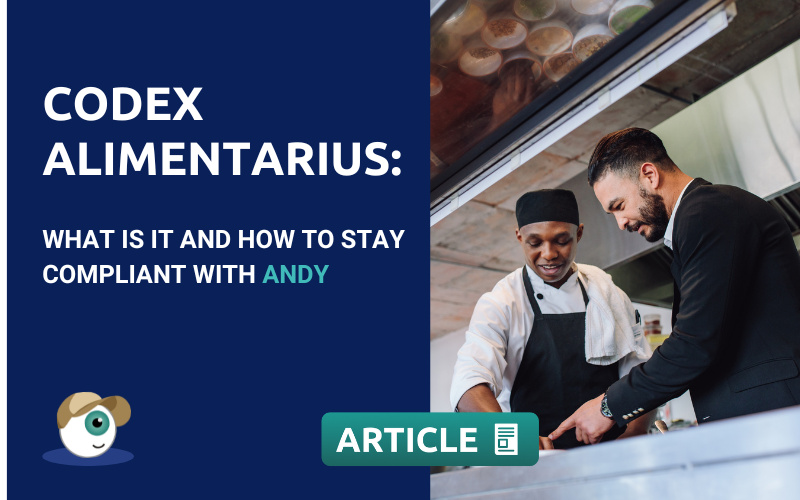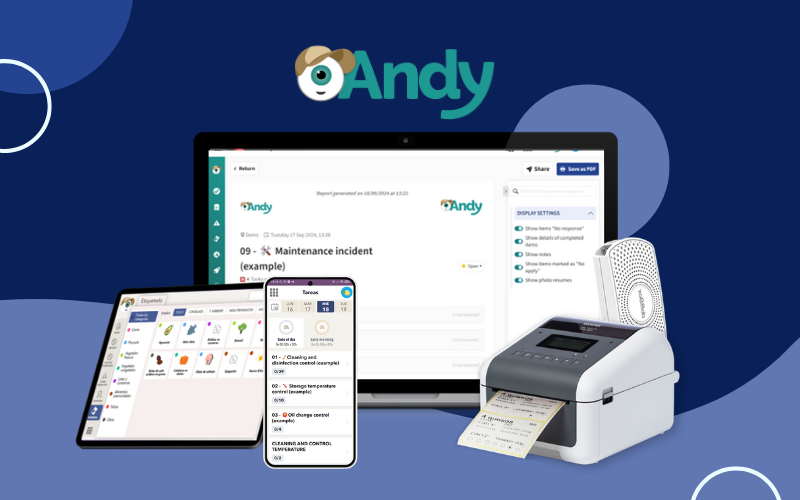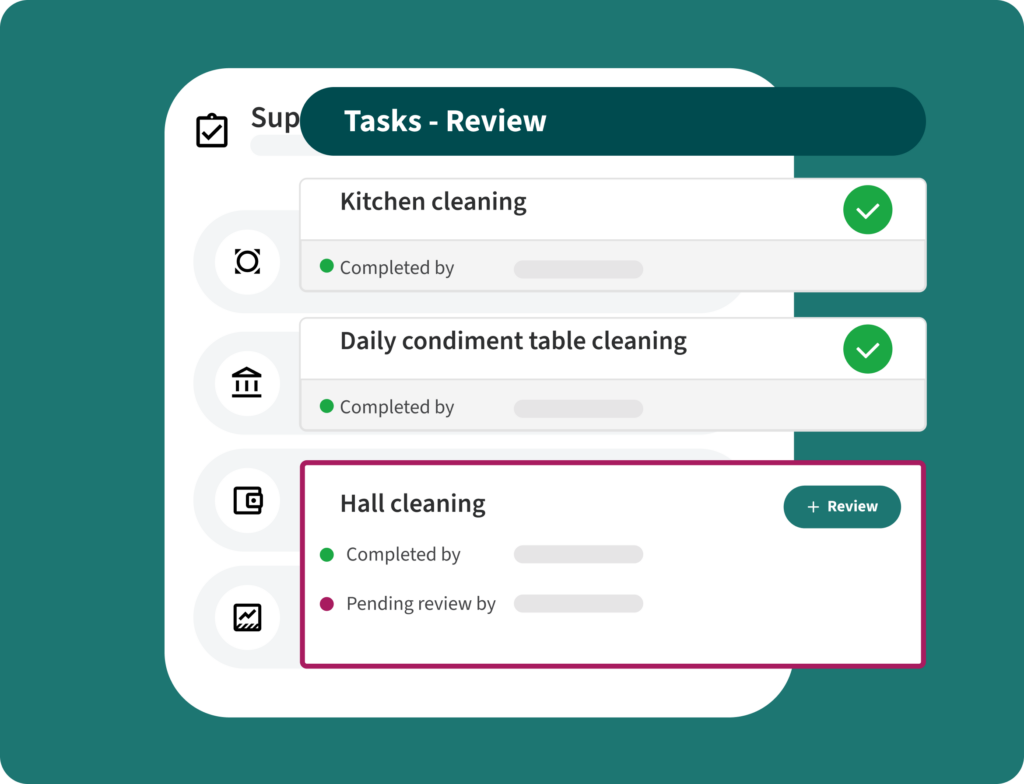The Codex Alimentarius – What is it and How to Stay Compliant with Andy

The Codex Alimentarius is the international “Food Code” developed by the FAO and WHO. It sets global standards for food safety, quality and fair trade – and guides national laws worldwide.
What Is the Codex Alimentarius?
The Codex Alimentarius – Latin for Food Code – is a global collection of food standards, guidelines, and codes of practice.
It was created jointly by the Food and Agriculture Organization (FAO) and the World Health Organization (WHO) in 1963 to build a common foundation for food safety across countries and regions.
Its goals are simple yet vital:
-
Protect the health of consumers, ensuring food is safe and of acceptable quality.
-
Ensure fair practices in the international food trade, by harmonising rules and terminology.
Today, the Codex provides a shared scientific reference for nearly 190 member countries and is recognised by the World Trade Organization (WTO) as the benchmark for food-safety regulation and dispute resolution.
What Does the Codex Cover?
The Codex brings together more than 200 standards, 80 guidelines and 50 codes of practice – covering virtually every aspect of food production, handling and sale.
It defines global recommendations on:
-
Food hygiene and processing standards
-
Food additives, contaminants and pesticide residues
-
Veterinary drug residues in animal products
-
Food labelling and nutritional claims
-
Methods of analysis and sampling
-
Import/export certification and inspection
💡The Codex Alimentarius acts as a universal food-safety dictionary – the common language regulators, producers and traders use to ensure food is safe everywhere it travels.
The Legislative Overview: The Codex and UK Food Law
In the United Kingdom, the Codex Alimentarius plays an important advisory and scientific role.
While Codex standards are not directly binding, they strongly influence national law and inspection procedures managed by the Food Standards Agency (FSA), Food Standards Scotland (FSS), and local authorities.
1. The FSA and Codex alignment
The UK remains an active member of the Codex Alimentarius Commission and participates in multiple specialist committees — including those on food hygiene, contaminants, and nutrition labelling.
The Food Standards Agency uses Codex texts as the scientific foundation for domestic legislation and risk-assessment methodologies.
Key examples include:
-
The Food Safety Act 1990 and The Food Hygiene (England) Regulations 2013 — aligned with Codex General Principles of Food Hygiene.
-
The Food Information Regulations 2014 (implementing retained EU Regulation 1169/2011) — based on Codex labelling guidance.
-
The Food Additives, Flavourings, Enzymes and Extraction Solvents (England) Regulations 2013, reflecting Codex classifications and tolerances.
2. Post-Brexit regulatory framework
Since leaving the EU, the UK has retained most EU food-safety law under the Retained EU Law (Revocation and Reform) Act.
However, the FSA now has greater autonomy to adapt or update UK standards while continuing to reference Codex for scientific evidence and equivalence with international trade partners.
3. Recent Codex-linked updates
-
UK authorities have followed Codex discussions on front-of-pack nutrition labelling, allergen declaration, and digital traceability in online sales.
-
The 2024 Codex updates on food hygiene and allergens are expected to inform upcoming FSA consultations and revisions of domestic guidance.
In the UK, Codex standards guide the Food Standards Agency’s scientific approach – ensuring British food law remains internationally recognised and trusted after Brexit.
Why the Codex Matters to Food Service and Food Retail Brands
For food service chains, food manufacturers, or food retailers, understanding the Codex means speaking the language of global compliance.
Aligning your internal practices with Codex principles allows you to:
-
Simplify HACCP implementation and audits
-
Avoid discrepancies between markets
-
Demonstrate transparency to authorities and customers
-
Build brand credibility based on recognised global standards
But managing all this information manually can be overwhelming – and that’s where 🧢 Andy comes in.
Meet Andy: Your Digital Assistant for Food Safety & Operations
Andy turns Codex principles into everyday practice – digitalising food-safety tasks so teams can focus on quality, not paperwork.

Andy is the leading digital assistant for food-safety and operations management, trusted by thousands of foodservice and retail teams worldwide.
It helps you put Codex principles into action by simplifying every step of compliance.
With Andy, you can:
✅ Digitalise HACCP and hygiene controls – automatic temperature logs, cleaning checklists and maintenance schedules.
✅ Ensure accurate labelling and traceability, aligned with Codex and local legislation.
✅ Centralise documentation for audits and inspections – no more missing paper logs.
✅ Receive smart alerts to prevent errors and maintain full compliance.
✅ Train teams with intuitive reminders and clear task dashboards.
💡 Andy bridges the gap between international food standards and day-to-day kitchen reality.
It’s like having a food-safety expert in your pocket – consistent, precise and multilingual.

Codex Compliance in Practice
Whether you operate in food service, healthcare catering, hotel’s F & B or food retail, adopting Codex-aligned digital systems brings measurable benefits:
-
Regulatory readiness: be audit-ready at any time.
-
Efficiency: save hours each week by automating routine safety checks.
-
Transparency: build customer confidence through real-time reporting.
-
Sustainability: reduce paper waste and improve accountability across supply chains.
Andy’s centralised control panel gives you a complete view of compliance – showing what’s done, what’s pending and where risks might emerge.
That’s how digital transformation becomes a tool for both safety and competitiveness.
The Future of Global Food Standards
As food systems grow more connected, the Codex continues to evolve.
New topics under discussion include:
-
Sustainability and climate-related risks
-
Digital traceability and data interoperability
-
Novel foods and alternative proteins
-
Online food sales and e-commerce transparency
Andy is already helping teams adapt to these changes – integrating digital recordkeeping, multilingual interfaces and analytics that make compliance effortless.
💡 The Codex Alimentarius is not just a book of rules – it’s the foundation of global food safety. It tells us what must be done. By combining Codex science with smart technology, Andy empowers food businesses everywhere to deliver safer, more transparent, and more sustainable operations.
Stay compliant. Stay confident. With Andy, your digital ally for food safety and operations excellence.




